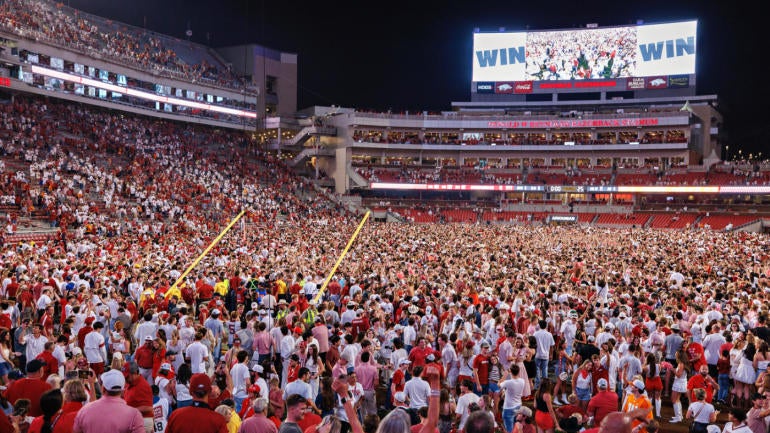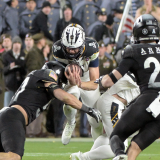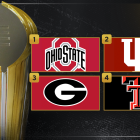As college football relentlessly pursues something bigger, what will it leave behind?
Whether every athletic department chasing the biggest bag is going to diminish generations of fandom in college football is a question we don't know the answer to.

All this talk "Project Rudy" talk had the CBS/247Sports college football slack channel buzzing Tuesday afternoon, especially in advance of Thursday's meeting in Nashville between the Big Ten and SEC. Fifty messages or so into our slack thread, we realized this is rather compelling content. The below is a lightly-edited transcript of our conversation.
What do athletic departments gain from chasing the most money?
Chris Hummer: Can someone answer a question for me I'm just curious about: What's the point of athletic departments chasing so much extra revenue, especially in places like the SEC and Big Ten?
They're not really for-profit enterprises. There are no shareholders you're responsible to other than in the general concept of winning games. If anything, creating extra revenue makes it harder in the long term as schools will have to pay more as part of a revenue share to players. It also continues to make their general position that athletes aren't employees seem more and more absurd. It's just a cycle where they'll have to continue to raise more and more while squeezing so many of their peers out of the picture.
The answer is probably: "Get ahead of the competition." But if the rev share really is capped at like 22 million, why do you need to generate so much extra revenue?
I know these athletic departments aren't run like actual businesses -- what other established business could bring in 200-plus million in revenue and spend every bit of it annually? -- but it's something that's confused me about this era of the sport.
Richard Johnson: For starters most of the schools outside of the 25 or so you can name off the top of your head adding $21 million overnight isn't a snap of the finger. It's gonna come through a mix of slashing the budget and adding revenue in some way.
But the other thing is the costs of everything continue to rise. I don't personally believe coaching salaries are actually gonna stop going up now that the players will be paid by the school via rev shares. I think the schools like to parrot that line of thinking, but the open market I believe will prove otherwise. Many athletic programs have already seen the contributions from the school side dwindle or even vanish as far as student fee subsidies are concerned, and there's also the diversion of donations to collectives that all donors have to think about.
Shehan Jeyarajah: It's loss aversion. They're more concerned about getting left behind than what the excess money can do for them. And that impact is probably as much reputation driven (see Florida State or Clemson in the ACC) than driven by real financial impact.
I often look at a program like Arkansas. Their pathway to competing in the SEC is slim, and maybe impossible in a post-realignment world. When Texas A&M opened the door to Texas and DFW recruiting across the entire SEC, Arkansas lost its biggest niche. There's a case that if Arkansas moved to the Big 12, for example, they could be the No. 1 program from a combination of resource, fan support and tradition. It could lead to the program actually having better teams, more College Football Playoff success and true national contention. But still, Arkansas would rather be No. 13 than No. 1 in the Big 12 because they don't want to be left behind. They would rather lose while being in the club than win and risk getting left out.
Brad Crawford: It's the same deal at South Carolina. The Gamecocks would have been more successful on the field had they stayed in the ACC, but they took the money in the SEC. Several programs have done this over various SEC expansions.
Hummer: I agree to a point. Arkansas would be better in the Big 12. But I don't think any of us would take a 50% pay cut just to be in a smaller market where it's easier to do your job. You take the money, work harder and continue to get better, which is exactly what I would try to do at Arkansas, a program with a history in this century of national title contention. It's not like there's no proof of concept for most of these programs. It's happened before.
My hangup is chasing additional revenue when it only complicates things for the program and sport moving forward. But I know how our society works. If there's money out there, it will be chased.
It's why we have realignment. It's why the NCAA and the schools held on for so long without making common-sense changes that would have made players happy without totally altering the sport.
But here we are.
Will shrinking the number of relevant teams diminish interest in the sport?
John Talty: The point I always make is no one is hanging banners for how much revenue you bring in. Fans want wins. It's depressing for those teams in the bottom third of the Big Ten or SEC knowing you're making a lot of money, but so is everybody else in your conference. What's the path forward? Outside of catching lightning in a bottle with some transcendent coach, it's tough.
Jeyarajah: The other issue is, do fanbases realize they're about to be outside of the club? Take Auburn, a program that has played for multiple national championships in the last 15 years. Over the next decade, they very well might be the 11th-best program in the conference and consistently miss bowls. That's not how their fans have seen themselves. It's not going to only be Vanderbilt, Purdue and Mississippi State struggling. Teams with championships are about to live in a new reality. Is there a point where it actually impacts fan support and interest?
Talty: No one wants to hear it because TV ratings are booming, but this would be my No. 1 concern moving forward. I don't think we've actually truly felt the impact of all the realignment and college football changes yet.
Johnson: I don't think that's true anymore. The Vandy moments are fun, but give me Alabama-Georgia over Alabama-Vanderbilt 100 times out of 100.
Talty: The question I'd have, though, is that it's an inferior product to the NFL in many ways. If you take away the wacky results, the wild upsets, the traditions, at what point is it just a watered-down NFL?
Johnson: I don't think the regular fan particularly knows or even cares that the football is not as good. Personally, I'm into both of them for different reasons. I've always said I'm married to college football and I date the NFL.
Crawford: Maybe to football purists it's an inferior product, but there are much bigger plays and drama in college football.
Talty: I prefer college football to the NFL because it's more fun and there's no NFL equivalent to Larry from Shelby. But I'd just worry that if you strip away what makes it unique, it starts becoming more and more like the NFL.
Crawford: I feel bad for the Group of Five fans. A crazed East Carolina fan is no less passionate than a crazed Alabama fan, but the college football content machine dictates that we're fed Tide every day of the week.
How do people become college football fans?
Jeyarajah: I dabbled in college football as a kid when Vince Young led Texas to a title, but I would have never been a college football fan had I not gone to Baylor at a time when they were relevant. Richard, I know you grew up in Florida going to games during the Urban Meyer era.
If Florida, Baylor or Arkansas were irrelevant to the sport, there's no guarantee any of us would be doing this job. All of them could very well be on this trajectory. Does Jeff in Tulsa care about Alabama-Georgia if he never becomes an Oklahoma State or college football fan in the first place?
Brandon Marcello: Most fans, I believe, grow to love college football because of a regional tie to a school close to them. I never would have been a college football fan if not for moving to Arkansas in middle school and being introduced to the Razorbacks. I could see 'em and touch 'em, so to speak, because they were here and live in person. I grew up in South Mississippi and it was a hodgepodge of Mississippi State, Ole Miss, Alabama and LSU fans with no true allegiances and direct lines to a university.
The sport is bigger than school ties, sure, but I don't believe the sport is built on Alabama, Georgia and Michigan fans being spread across the country. That's an NFL way of thinking. If that's what the power brokers want the sport to become, then return on investment will dwindle with an inferior NFL-lite product. College football is what it is because of the smaller programs breaking through every few years. You've got to leave that in there. If you don't, at what point do we tire of three in-season matchups every year or two between Alabama and Michigan just for the sake of money? I love cheesecake, but you can't eat that at every meal.
Johnson: I think there's a difference in how we got into college football versus how the current and next generations will get into it and I think there's a bigger difference in what got people into the game and what will get people to stay in the future. I am frankly willing to call the bluff that people don't want to see a Michigan play more Texas and Oregons than they do Bowling Greens and Rutgers overall and it's not just a made for TV thing. In-person fans (especially students) become less interested in attending games against opponents with 25-point spreads. Yes Vandy over Alabama is cool, and it's cool because we haven't seen it in 40 years. But you sat through 25 versions of what the game usually is.

Jeyarajah: Sure, but at the end of the day, we have 134 FBS schools and every single one of them has passionate fans. Some have more than others, but nothing makes an Alabama fan more important than a San Jose State fan. What makes college football amazing is the fact that history is made every single week, and that it's a grassroots sport. When there are 134 teams at the highest level, there are 134 pathways to becoming a fan. If that number dips from 134 to 20, we have to deal with the fallout of the fact that people in Boise, Blacksburg or Toledo might just never tune in.
Some fans will turn on the TV and see Alabama-Michigan, and think the helmets are cool and keep tuning in. Others will turn that game on, and then turn on Chiefs-Bengals and think those teams are cooler. If people want parity and exclusively competitive games, there's a great league for that -- it's called the NFL. If people want to see something they've never, ever seen before every single week, college football is here for you.


















